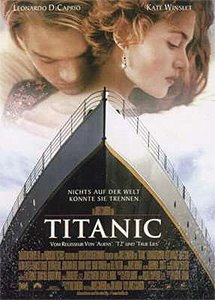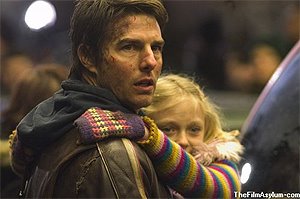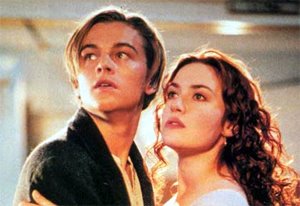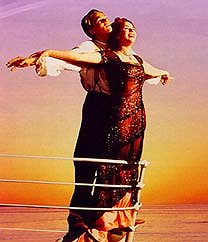 As much as I’d like to say that Titanic is sappy and overly romantic and a chick-flick, the reality is that it is a truly wonderful film. The film features Kate Winslet as Rose DeWitt Bukater, the rich, restless woman engaged to the snobbish Caledon 'Cal' Hockley, played by Billy Zane, but instead falls for the penniless artist hunk Jack Dawson, portrayed by Leonardo DiCaprio. This was DiCarprio’s breakout performance and made him a heartthrob and an A-List actor.
As much as I’d like to say that Titanic is sappy and overly romantic and a chick-flick, the reality is that it is a truly wonderful film. The film features Kate Winslet as Rose DeWitt Bukater, the rich, restless woman engaged to the snobbish Caledon 'Cal' Hockley, played by Billy Zane, but instead falls for the penniless artist hunk Jack Dawson, portrayed by Leonardo DiCaprio. This was DiCarprio’s breakout performance and made him a heartthrob and an A-List actor.The classic love triangle pulls in the female viewers and the action of the impending fate of Titanic and its passengers keeps the men enthralled. Director James Cameron does a great job of interweaving the various plot elements and minor characters to provide a colorful tapestry of the people on the ship and the struggles that await them.
When approaching the way to relay an epic “catastrophe” story, you can usually take one of two paths, both of which try to connect the audience emotionally to the major events that are about to unfold. The first path is to keep the characters in the film small, as Steven Spielberg chose to do in his take of War of the Worlds. In Worlds, the main character, and virtually the only character by which the audience can attempt to identify with emotionally, is Ray Ferrier, played by Tom Cruise. All of the other people impacted by the events of the alien invasion are primarily periphery characters that Cruise happens to interact with during his journey. This path can be very effective, but relies solely on the audience becoming emotionally connected to that main character. If the audience does not make that connection, they become passive observers and not active participants in the journey of the film.
 The second path, and usually more successful, is to take an epic event and pepper in multiple characters that offer the audience many ways to emotionally connect. The risk here is that the secondary characters will not be fleshed out sufficiently and can become cardboard caricatures, which undermines the overall effectiveness of the film. However, if you have enough primary and secondary characters that are well written and well acted, then the emotional impact of the catastrophe is greatly enhanced, as the audience will be emotionally invested in these characters. This has worked on films such as Independence Day, The Day After Tomorrow, Airport and Titanic.
The second path, and usually more successful, is to take an epic event and pepper in multiple characters that offer the audience many ways to emotionally connect. The risk here is that the secondary characters will not be fleshed out sufficiently and can become cardboard caricatures, which undermines the overall effectiveness of the film. However, if you have enough primary and secondary characters that are well written and well acted, then the emotional impact of the catastrophe is greatly enhanced, as the audience will be emotionally invested in these characters. This has worked on films such as Independence Day, The Day After Tomorrow, Airport and Titanic. The soundtrack for Titanic, by my personal favorite composer James Horner, is wonderful. Simply listening to the soundtrack without the film in front of you generates an emotional response. Adding that soundtrack to augment the action on the screen ramps up the impact even more.
The soundtrack for Titanic, by my personal favorite composer James Horner, is wonderful. Simply listening to the soundtrack without the film in front of you generates an emotional response. Adding that soundtrack to augment the action on the screen ramps up the impact even more. A special nod goes to Winslet, who is one of the most fearless and talented actresses I’ve seen. Her career is full of such a diverse number of characters and her complete self confidence in her own body and its imperfections is so rare in Hollywood today. God gave her curves and she’s absolutely okay with that. She doesn’t try to look like everyone else, she simply takes what God has given her and uses it to the best of her ability, which makes her and her look unique. Layer on that confidence with boatloads of acting talent and you find one of the great actresses working today in such films as Eternal Sunshine of a Spotless Mind, Finding Neverland and Sense and Sensibility.
A special nod goes to Winslet, who is one of the most fearless and talented actresses I’ve seen. Her career is full of such a diverse number of characters and her complete self confidence in her own body and its imperfections is so rare in Hollywood today. God gave her curves and she’s absolutely okay with that. She doesn’t try to look like everyone else, she simply takes what God has given her and uses it to the best of her ability, which makes her and her look unique. Layer on that confidence with boatloads of acting talent and you find one of the great actresses working today in such films as Eternal Sunshine of a Spotless Mind, Finding Neverland and Sense and Sensibility.Despite the impact on my inherent manliness, I must confess that I love the film Titanic. It achieves the impossible… taking an historic event in which the entire audience knows how it ends, and makes it somehow new and enjoyable and emotionally worthwhile. Its one of those films where all of the creative stars aligned and made something special.






No comments:
Post a Comment